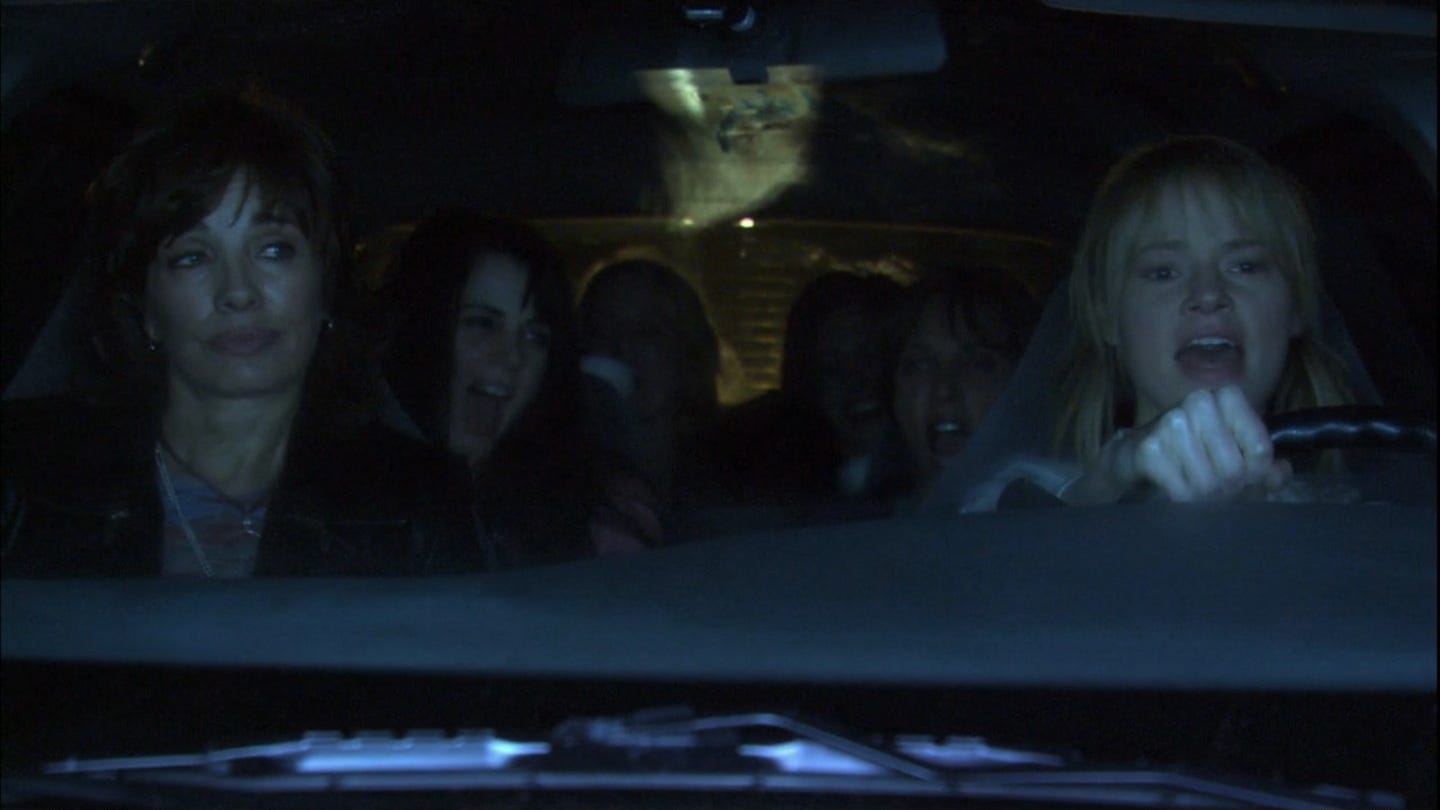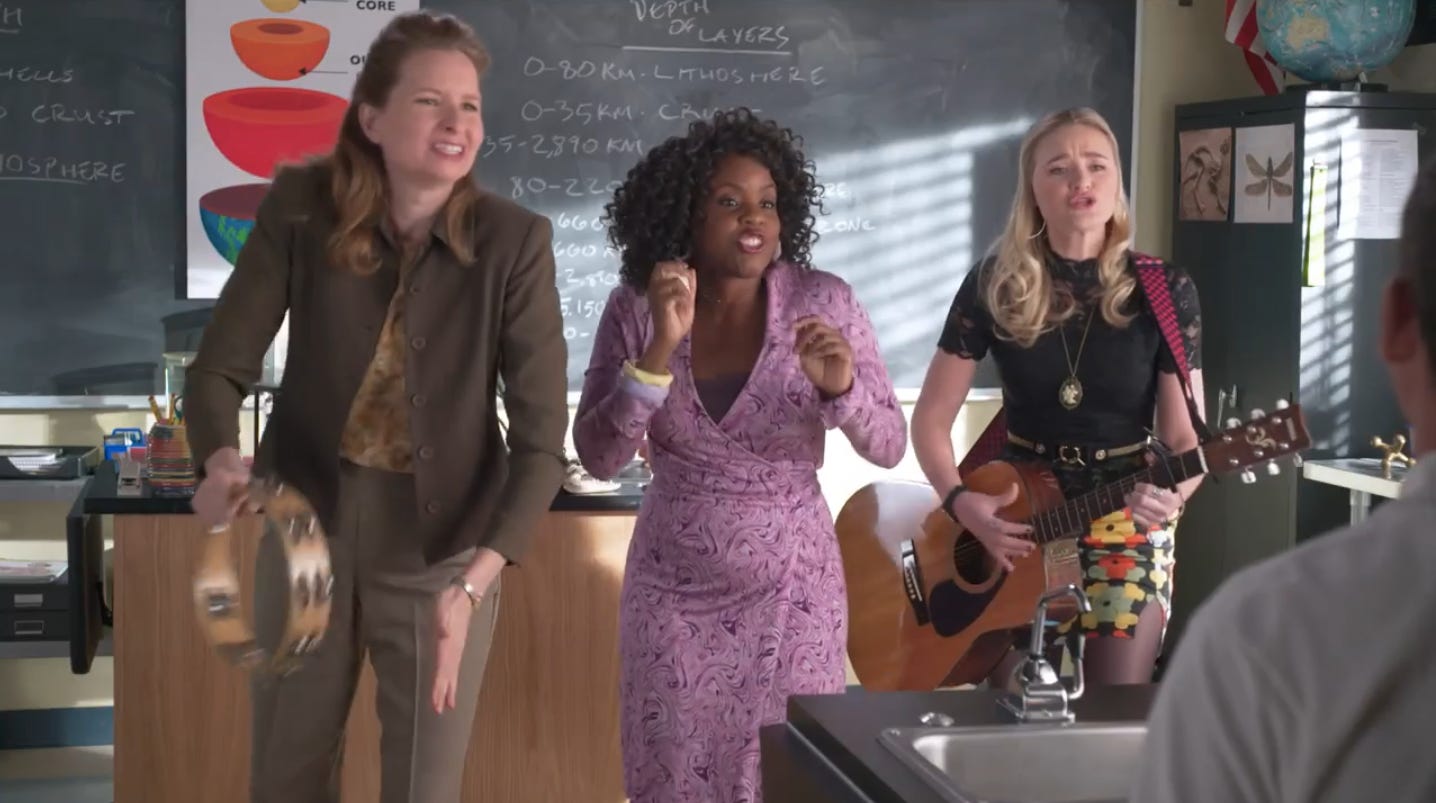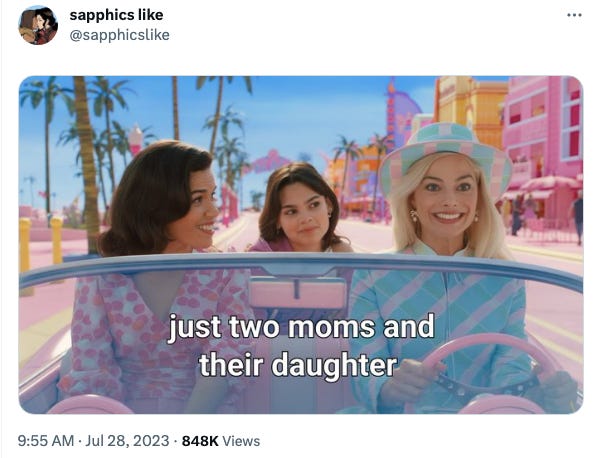Paging Dr. Lesbian - Closer to Fine: An On-Screen Journey
This is the Sunday Edition of Paging Dr. Lesbian. If you like this type of thing, subscribe, and share it with your friends. Upgrade your subscription for more, including weekly dispatches from the lesbian internet and monthly playlists. You can also buy PDL stickers What makes a piece of media mainstream? A song that’s featured in a summer blockbuster and is immediately recognizable to millions of people would seem to qualify. This describes the standing of “Closer to Fine,” the Indigo Girls song that was first released in 1989. The song plays not once but three times in Greta Gerwig’s new Barbie movie, indicating its enduring popularity and relevance as a folksy feminist hit. It’s the most mainstream use of the song in film and TV history, and its reputation in 2023 illustrates how much things have changed since the band first emerged on the scene. For a long time, the Indigo Girls – composed of Amy Ray and Emily Saliers, both lesbians – were the butt of homophobic jokes. “It seemed like the most derogatory thing you could be is a female gay singer-songwriter,” Ray says in the documentary It’s Only Life After All. Seen as the archetypal crunchy lesbian feminist band, they were rarely taken seriously by mainstream listeners despite their remarkable success. (Their first album, which includes “Closer to Fine,” went double platinum and won a Grammy.) Saliers sees the song’s inclusion in Gerwig’s film as an indication of how culture has progressed over the years. “We no longer are the brunt of a joke and we’re flourishing in certain ways in terms of this relevancy, which is gratifying. It’s strange, you know, to watch culture change and move — and it really has changed for us,” she told Trish Bendix in The New York Times. Ray explained that “Closer To Fine” represents “80 percent of the band’s licensing,” but they rarely know much about how the song will be used. Barbie is far from the first film or television show to wield the song, and a look back at where it has emerged in pop culture over the years might tell us something about how the meaning(s) of the song have changed over time. Have the Indigo Girls become an accepted part of the mainstream? Have our collective views about women and lesbians become more progressive? And what is this song doing in the Barbie movie anyway? The first recorded use of “Closer to Fine” in TV or film is exactly what you’d expect. Though it was released in ‘89, Tunefind tells us the song wasn’t played on TV until 2004, when it was featured in a Season 1 episode of The L Word. It’s one of five different instances of the song being sung by characters in the car. Tina (Laurel Holloman), Shane (Kate Moennig), Dana (Erin Daniels), Jenny (Mia Kirshner), Alice (Leisha Hailey), and Alice’s mom, Lenore (Anne Archer), are making the drive to Dinah Shore, the lesbian party in Palm Springs. They start singing the song at night – with no backing music – and then it cuts to the morning and they’re still singing the song, eventually dissolving into tired whistles. They know all of the words, and even do the Amy/Emily harmonies in the last chorus. Alice’s mom is completely over it, and when they finally finish, she complains, “Oh thank god, do you know how many times I had to hear that song when Alice was first coming out of the closet? It was a nightmare.” There is some humor to this scene, of course, but it’s all an in-joke. These are lesbians in 2004, so obviously they like the Indigo Girls. On a Reddit thread about this scene, one user noted that this moment was when they officially became a fan of the show because of how accurate it is. “I don’t know any lesbians my age that didn’t sing Closer to Fine at the top of their lungs on a road trip. It’s a rite of passage,” they wrote. The bit works precisely because it’s speaking to and for lesbians, and the humor of the scene isn’t derogatory. The song is most commonly featured in road trip scenes, to the point where it’s almost become a trope. Saliers, who wrote the song shortly after graduating college, says she understands why this is the case. It’s easy to sing along to, and “When you get to a chorus of a song that you’re into and you can just sing it at the top of your lungs, I think just structurally, melodically, it’s really a road trip song,” she explained. The song is about seeking knowledge or something resembling the meaning of life, and this kind of existential questioning also lends itself to the open road. And, as The L Word characters – and that Reddit user – illustrate, it’s a lesbian anthem that immediately brings people together. The song’s second TV appearance is the most discordant of the bunch, and it’s the only example where the song isn’t used to make a point or poke fun at gender or sexuality in some way. “Closer to Fine” plays in the opening scene of a 2004 episode of Cold Case, the CBS crime procedural. Each episode sees the detectives solving a murder that happened sometime in the past, and the flashback scenes always include a song from the year the murder was committed. This episode looks at a woman who was murdered in front of her young son in 1989, hence the use of “Closer to Fine” in the opening sequence. It’s the only time the song has ever been used to soundtrack a murder, and the incongruity is part of what makes the scene so haunting. Most on-screen uses of “Closer to Fine” depict characters singing along to the song, and The Office is another example. In a 2006 episode of the show, Jim (John Krasinski) and Andy (Ed Helms) get drunk while working late at the office one night. In their drunken stupor, they begin an emphatic sing-along, even though Karen (Rashida Jones) forbids acapella in the office. Part of the humor in this scene is the fact that these two straight men know all of the words to this classic lesbian feminist song and feel so passionately about singing it. Perhaps we are to believe that their inebriated state has unlocked their more sensitive side, though characters on The Office aren’t known for being embarrassed by their own bumbling antics. The sitcom Happy Endings also portrays a straight man singing “Closer to Fine.” The show’s pilot episode, which premiered in 2011, follows a wedding gone awry when Alex (Elisha Cuthbert) leaves Dave (Zachary Knighton) at the altar. Dave is devastated and spends a week wallowing in a post-breakup malaise. When his friends come to check on him, his apartment is a mess, and he is lying on the couch singing “Closer to Fine.” There are a number of different songs that could have worked in this scene – including ones that are more clearly about breakups or being alone – but “Closer to Fine” seems to indicate that Dave is really getting in touch with his emotions. It’s as if he’s using the Indigo Girls to try and cheer himself up, which is funny in and of itself considering the straight male archetype he represents (or perhaps satirizes). A 2015 episode of the Amazon series Transparent illustrates the most prototypical appearance of “Closer to Fine.” Maura (Jeffrey Tambor), who recently came out as trans, is on her way to a women’s music festival with her two daughters Ali (Gaby Hoffmann) and Sarah (Amy Landecker). There is no way they can make the drive without listening to “Closer to Fine.” Ali and Sarah know all the words and belt them out, while Maura is less familiar and tries to join in when she can. Maura’s journey to the women’s music festival and her (re)introduction to the Indigo Girls is framed as a sort of initiation into a particular kind of (white, middle-aged) womanhood. This one Indigo Girls song quickly expresses all of these cultural meanings without the need for further exposition. One of the only times “Closer to Fine” has been used in film is in a movie you’ve probably never heard of called The Hollars (2016). John Krasinksi (in his second entry on this list) plays John, a NYC artist who returns home when he learns his mother, Sally (Margo Martindale) needs brain surgery. Just as she’s about to be taken into the operating room, Sally loses her nerve and has a bit of a freak-out. In order to calm her down, her husband (Richard Jenkins) starts singing “Closer to Fine,” which we learn is her favorite song. Her two sons join in and soon she is smiling and laughing all the way to the OR. The actual song begins to play during the operation and the mood of the film lightens considerably. As is often the case when it’s featured in television or film, “Closer to Fine” is shown to have an involuntary power over those who hear or sing it, which is exactly why it works in these emotional scenes. In the ABC sitcom Schooled, which is a spin-off of The Goldbergs, “Closer to Fine” is depicted as a song that defines womanhood. The series is set at a high school in the 1990s and follows the teachers there, including young music teacher Lainey Lewis (AJ Michalka of Aly and AJ fame). In a 2020 episode, PE coach Rick Mellor (Bryan Callen) tries to prove to his girlfriend, Nurse Julie (Valeria Azlynn) that they have shared interests by lying and saying he knows what Lilith Fair is. Fellow teacher Wilma (Haneefah Wood) gives him a crash course in women’s music, and says that the most important lesson is “Closer to Fine,” which he needs to know by heart. “It’s every woman’s siren song, the moment we hear it we have to drop whatever we’re doing and sing along,” she explains. Proving her point, Lainey suddenly walks in with a guitar and starts singing, and another teacher, Liz (Lennon Parham), appears with a tambourine. This display of women-power terrifies the coach and runs away. Later in the episode, he serenades Nurse Julie with the song and all three women join in, apparently powerless to stop themselves. There are no lesbian implications here, and instead, the song serves as a stand-in for ‘90s womanhood, broadly speaking. In this case, the song is a sort of dog whistle for women, one that men aren’t trained to hear. In the excellent Showtime series Work In Progress, “Closer to Fine” is used in exactly the same way as it is in Transparent. In a 2021 episode of the series, which outlines the start of COVID, Abby (Abby McEnany) and her best friend Campbell (Celeste Pechous) reminisce about their college days. They recall the time when they drove to a women’s music festival and, as is tradition, sang along to “Closer to Fine” in the car. Much like in Transparent, the episode delves into issues of gender, sexuality, and specifically trans inclusion/exclusion at these events. “Closer to Fine” is painted as a lesbian anthem, and young Abby learns to be a lesbian through experiences like these. “Closer to Fine” was referenced twice in Season 47, of Saturday Night Live, which aired in 2022. In the first episode, Kate McKinnon and Ariana DeBose play scholars delivering a lecture about newly discovered Sappho poems. The artifacts include references to Nalgene water bottles and Dana Scully from The X-Files, with the final scroll reading: "I went to the doctor / I went to the mountains / I look to the children / I drank from the fountain..." – lyrics from “Closer to Fine.” According to this skit, “Closer to Fine” is essentially the lesbian bible. The second skit is entitled “Grey Adult Pigtails,” and portrays middle-aged and older women sporting the aforementioned hairstyle. Supposedly, this is the hairstyle of self-consciously alternative, “hippie” women who want everyone to know they’re a little bit unusual. The skit begins with the instrumental music from “Closer to Fine,” not the lyrics, and thus is only noticeable to viewers who are true fans. (The skit ends with the characters singing along to “The Circle Game” by Joni Mitchell, which feels like an analogous cultural reference.) In this context, “Closer to Fine” is associated with a sort of dorkiness that befalls women of a certain age who refuse to let go of the past. This skit firmly places the song in a bygone era that is no longer relevant – or at least cool – to a new generation. 9-1-1 is one of the few examples where “Closer to Fine” isn’t used as a sing-along song. The song plays at the end of the Season 5 finale, which depicts each of the characters tying up loose ends and looking toward the future. The show’s lesbian couple, Hen (Aisha Hinds) and Karen (Tracie Thoms) decide to have a second wedding because Hen’s mom didn’t come to the first one. The song begins to play as guests arrive and soundtracks their walk down the aisle. Later, the song continues as the other characters deal with interpersonal relationships and prepare for another busy day at the firehouse. The lesbian connection here is obvious, but the song is also meant to apply to all the characters in the show as they strive to become “Closer to Fine.” Most recently, “Closer to Fine” appears in a 2022 episode of Firefly Lane, a Netflix series about two women who have been best friends for thirty years. Kate (Sarah Chalke) sees messages on her daughter’s computer indicating that she might be gay, and she goes a little overboard trying to prove to her that their home is a safe space. She puts on “Closer to Fine” in the car and sings along enthusiastically before asking her daughter, “Do you know the Indigo Girls?” She then poorly explains who the Indigo Girls are – at first, she thinks only one of them is gay and then she claims they’re in a relationship – while her daughter gets increasingly weirded out. She wants to relate to her daughter by portraying herself as cool and liberal, but none of her references hit home. The joke of the scene is that the Indigo Girls is the most obvious choice she could have picked, and it doesn’t seem to resonate with her daughter despite the fact that this portion of the show takes place in the mid-2000s. That brings us to Barbie. “Closer to Fine” is used three times in the film during its numerous road trip scenes. As we’ve learned, this is the most common context for the song. The first time it plays, Barbie (Margot Robbie) is driving from Barbieland to the real world. The song comes on the stereo (or the radio?) and she cheerfully sings along until Ken (Ryan Gosling) appears in the backseat. The fact that the Indigo Girls have apparently permeated the idyllic community of Barbieland is funny enough, and Barbie knowing all the words to the song despite being a non-thinking doll is even more amusing. Later, Barbie takes Gloria (America Ferrera) and her daughter Sasha (Ariana Greenblatt) back to Barbieland, and the song plays once more. Gloria and Barbie are delighted and sing along, while Sasha scoffs and rolls her eyes like the tween she is in the backseat. Sasha is confused by the hold this song has over women of a certain age, a phenomenon we’ve seen in previous iterations of scenes like this. The final time the song plays in the car, Sasha can’t help herself and she joins the sing-along, having repaired her fraught relationship with her mother. “Closer to Fine” is a song about existential searching, after all, and by the end of the film, these three women have all become more comfortable expressing their truest selves. If you’re not looking for anything else, this scene can easily be read as just another road trip scene. But “Closer to Fine” has accumulated so much meaning over the years, and other sequences in the film point to a deeper subtext. Just before Barbie takes her big trip to the real world, Weird Barbie (Kate McKinnon) gives her a heroic choice a la The Matrix. In one hand Weird Barbie holds a high heel, and in the other hand, a Birkenstock sandal. Barbie must choose if she wants to maintain her false consciousness (represented by the high heel) or learn the truth (represented by the Birkenstock). Barbie chooses the high heel, but Weird Barbie tells her it’s not really a choice at all and she must choose the Birkenstock. The combination of the Birkenstock joke, Kate McKinnon’s role in the film, and the multiple Indigo Girls needle drops indicate that there is some subliminal (or not so subliminal) messaging at play. Indeed, ever since the trailer for the movie dropped, lesbian and queer fans have been “shipping” Gloria and Barbie together, and the finished film only strengthens these fans’ convictions that something queer is going on here.
These are cheeky lesbian jokes in a film where the main characters seem to have no discernable sexual desire (and no genitals to boot). Featuring the Indigo Girls in this context is kind of like having your cake and eating it too. The use of “Closer to Fine” here recalls multiple meanings of the song, and in this setting appeals both to liberal-minded feminists and lesbian viewers. The song has become so recognizable to listeners that it can be featured in a huge blockbuster film and its various implications will be understood by most audiences. The humor that stems from the song’s placement in the movie is far from mean-spirited, and instead works more as a wink to women over 40 and a nod to the lesbians. Queer fans who wanted more explicitly lesbian content from the film certainly aren’t delusional – especially considering the well-documented practice of scissoring Barbies – but Barbie tends to paint things in broad strokes, and those strokes don’t include gay dolls. Ultimately, “Closer to Fine” represents both the film’s easily digestible feminist messaging and its unmined lesbian potential. You’re a free subscriber to Paging Dr. Lesbian. For the full experience, which includes weekly dispatches from the lesbian internet, become a paying subscriber. Your support means a lot! |
Older messages
Gay Shame and Queer Failure in 'The Children's Hour' (1961)
Sunday, July 23, 2023
A potent lesbian tragedy in three acts
The Top Eight Mission: Impossible 7 Scenes for People Who Love Hot Women
Sunday, July 16, 2023
•Saoirse Ronan Voice•
What's In A (Lesbian) Word?
Sunday, July 9, 2023
On The L Word and Other Queer Phrases
What Is Lesbian Fashion?
Sunday, July 2, 2023
A chat with Eleanor Medhurst, the creator of Dressing Dykes
Bodies Ablaze
Sunday, June 25, 2023
Mrs. S is a New Kind of Queer Romance Novel
You Might Also Like
More On Urbanism and Natalism
Thursday, March 6, 2025
"Cities depress fertility" is not a metaphysical truth ͏ ͏ ͏ ͏ ͏ ͏ ͏ ͏ ͏ ͏ ͏ ͏ ͏ ͏ ͏ ͏ ͏ ͏ ͏ ͏ ͏ ͏ ͏ ͏ ͏ ͏ ͏ ͏ ͏ ͏ ͏ ͏ ͏ ͏ ͏ ͏ ͏ ͏ ͏ ͏ ͏ ͏ ͏ ͏ ͏ ͏ ͏ ͏ ͏ ͏ ͏ ͏ ͏ ͏ ͏ ͏ ͏ ͏ ͏ ͏ ͏ ͏ ͏ ͏ ͏ ͏ ͏ ͏
Women in Sign Painting: Burds of the Brush
Thursday, March 6, 2025
Rachel E Millar shares her and her guests' reflections on the first Burds of the Brush in Glasgow. BLAG Magazine: Adventures in Sign Painting Craft, Community & Culture Women in Sign Painting:
How to Win the Message War on Tariffs
Thursday, March 6, 2025
Trump decision to raise prices on every American is major vulnerability ͏ ͏ ͏ ͏ ͏ ͏ ͏ ͏ ͏ ͏ ͏ ͏ ͏ ͏ ͏ ͏ ͏ ͏ ͏ ͏ ͏ ͏ ͏ ͏ ͏ ͏ ͏ ͏ ͏ ͏ ͏ ͏ ͏ ͏ ͏ ͏ ͏ ͏ ͏ ͏ ͏ ͏ ͏ ͏ ͏ ͏ ͏ ͏ ͏ ͏ ͏ ͏ ͏ ͏ ͏ ͏ ͏ ͏ ͏ ͏ ͏ ͏ ͏ ͏ ͏
“A Beautiful House with a Hot Tub and Pool” by Jason Schneiderman
Thursday, March 6, 2025
I miss my magnolias, miss my maples, think ͏ ͏ ͏ ͏ ͏ ͏ ͏ ͏ ͏ ͏ ͏ ͏ ͏ ͏ ͏ ͏ ͏ ͏ ͏ ͏ ͏ ͏ ͏ ͏ ͏ ͏ ͏ ͏ ͏ ͏ ͏ ͏ ͏ ͏ ͏ ͏ ͏ ͏ ͏ ͏
Bring us a glass of milk for this dupe
Thursday, March 6, 2025
— Check out what we Skimm'd for you today March 6, 2025 Subscribe Read in browser Together with Alfa Romeo But first: experience Italian luxury every day Update location or View forecast Quote of
Meghan Markle Nailed The Easy Spring Outfit Of Our Dreams
Thursday, March 6, 2025
She met up with Serena Williams for a casual lunch date. The Zoe Report Daily The Zoe Report 3.5.2025 Meghan Markle Nailed The Easy Spring Outfit Of Our Dreams (Celebrity) Meghan Markle Nailed The Easy
What I Learned From a 30-Minute Recomp Workout
Wednesday, March 5, 2025
View in Browser Men's Health SHOP MVP EXCLUSIVES SUBSCRIBE What I Learned From a 30-Minute Recomp Workout What I Learned From a 30-Minute Recomp Workout Dr. Pat Davidson's 'Double-Deuce
What People Are Getting Wrong: Measles Myths
Wednesday, March 5, 2025
3 Roth IRA Rules to Know During Tax Season. It turns out that hosting "measles parties" is a bad idea. Not displaying correctly? View this newsletter online. TODAY'S FEATURED STORY What
‘My Friends Abandoned Me When They Had Kids’
Wednesday, March 5, 2025
Today in style, self, culture, and power. The Cut March 5, 2025 ADVICE 'My Friends Abandoned Me When They Had Kids' You need to pick one or two friendships and fight for them. The rest are
Sydney Sweeney Wore A Super Sparkly Dress With Cutouts After The Oscars
Wednesday, March 5, 2025
Plus, the hilarious Chelsea Handler, your daily horoscope, and more. Mar. 5, 2025 Bustle Daily Chelsea Handler shares four of her favorite books. Bustle ONE NIGHTSTAND Why Chelsea Handler Has No






